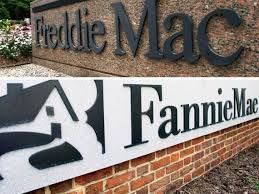Ok so rumors are flying all over the place that the government will shut down Fannie Mae and Freddie Mac. No they are not closing tomorrow, but slowly and gradually seems inevitable. Earnings at both the government-run enterprises have been lackluster to say the least, and it seems economist and many in the mortgage industry have already started to openly speak about a future without them.
 Dick Bove, an analyst who tracks the mortgage market, states “That could change the consumer mortgage landscape dramatically. Is the US ready to take a shock to housing prices because we are getting rid of a 30 year fixed rate mortgage?” Bove recently told CNBC that banking executives have told him privately they cannot make money on a 30-year fixed rate home loan anymore due to new rules on capital reserves and securitizing mortgages.
Dick Bove, an analyst who tracks the mortgage market, states “That could change the consumer mortgage landscape dramatically. Is the US ready to take a shock to housing prices because we are getting rid of a 30 year fixed rate mortgage?” Bove recently told CNBC that banking executives have told him privately they cannot make money on a 30-year fixed rate home loan anymore due to new rules on capital reserves and securitizing mortgages.
If Fannie Mae and Freddie Mac die that would take two of the biggest buyers of 30-year mortgages out of the equation. Of course banks would be willing to step in to buy offer more mortgages, just at a significantly lower term. Lets look at an example of payments for a same piece of Pensacola Real Estate I have sold multiple times:
| Loan at 5% | 30 Year | 25 Year | 20 Year | 15 Year | 10 Year |
| 100,000 | 536 | 584 | 659 | 790 | 1060 |
| 150,000 | 805 | 876 | 989 | 1186 | 1590 |
| 200,000 | 1073 | 1169 | 1319 | 1581 | 2121 |
You can see the difference between a 30 year payments and say a 15 or 10. This would change the buying power of many buyers. Jeff Taylor, managing director at Digital Risk, an independent mortgage processor that handles more than $8 billion per month in mortgages, agrees with Bove and says the end of the GSEs would lead to shorter mortgages and more expensive mortgages. “Thirty-year mortgages are harder to hedge against,” he says. “In a different rate environment, maybe the scenario would be different, but for now there would be no incentive to keep offering 30-years as an option.”
 I have been in the real estate and mortgage business since the late 80’s and I personally do not see the 30 year mortgage going anywhere REALLY soon. With that being said, I also understand the current requirements bank have for securitizing mortgages and increased capital reserves. The comments Bove put out is not as ground breaking as he may seem, as there has been talk of the 30 year mortgage dying for years. In my opinion, and it’s just that…..my opinion….I believe banks are going to improve underwriting requirements. I believe that we will see and increase demand for a higher down payment to decrease the risk the lender is taking on the borrower. That will help hedge some of the issues with securitization of the mortgages.
I have been in the real estate and mortgage business since the late 80’s and I personally do not see the 30 year mortgage going anywhere REALLY soon. With that being said, I also understand the current requirements bank have for securitizing mortgages and increased capital reserves. The comments Bove put out is not as ground breaking as he may seem, as there has been talk of the 30 year mortgage dying for years. In my opinion, and it’s just that…..my opinion….I believe banks are going to improve underwriting requirements. I believe that we will see and increase demand for a higher down payment to decrease the risk the lender is taking on the borrower. That will help hedge some of the issues with securitization of the mortgages.
It is ironic as I write this post conventional loans have just come out with a 3% down conventional product to compete with FHA’s 3.5% down product. When we take the Government Services Enterprises out of the equation, the competition changes. This is a subject I would pay attention too though. If you have the chance to lock in at these historically low rates and get a 30 year term, you may want to take advantage. If this does happen it will affect pricing of a property to sell, which is one of the six items I discuss in episode two of the podcast. LISTEN HERE




